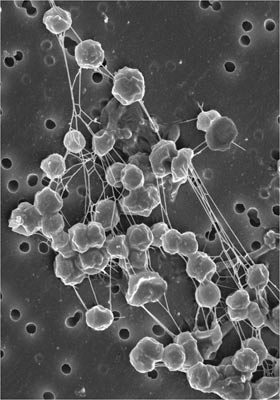
What Life on Earth Could Live on Mars?
Share
Another fan of ours has prodded our frontal lobes!
So it's time once again to.... Ask A.R.S.E!
"Hey guys, I get that Mars is another planet (obviously) and has a completely different atmosphere. But is there some lifeform on Earth that could withstand it?"
- Patricia
Thanks for the question Paula.
Surviving on Mars poses numerous challenges due to its harsh environment, including low atmospheric pressure, extreme temperatures, and lack of liquid water. However, some extremophiles, organisms adapted to survive in extreme conditions on Earth, might have theoretical potential. Here are a few examples:
1. Extremophilic Bacteria
Deinococcus radiodurans: Known for its extraordinary radiation resistance, this bacterium might withstand the increased radiation on Mars.
Thermophiles: Some bacteria thrive in high-temperature environments, and they might endure the temperature extremes on Mars.
2. Lichens
Lichens are a symbiotic combination of fungi and algae. They are known to survive in harsh environments on Earth, including extreme cold and low water availability. Their ability to photosynthesize might be an advantage in the limited sunlight on Mars.
Tardigrades (Water Bears)

These microscopic animals are incredibly resilient. They can survive extreme conditions, including radiation and dehydration. While Mars lacks liquid water on its surface, tardigrades can enter a dehydrated state and potentially survive.
Halophiles

Some organisms, such as certain bacteria and archaea, thrive in extremely salty conditions. The salt content in the Martian soil might be a factor that certain halophiles could adapt to.
Methanogens

Methanogenic archaea can survive in anaerobic environments and produce methane. Some extremophilic methanogens might find a niche in the subsurface of Mars, where conditions could be more favourable.
It's important to note that while these organisms might survive in specific Martian conditions, the overall environment is still highly challenging. Factors like low atmospheric pressure, high radiation levels, and the absence of a stable liquid water source remain significant obstacles for terrestrial life.
Moreover, the ethical considerations of introducing Earth life to Mars, even in microbial form, are crucial. Any potential future missions to Mars would need to be careful to avoid contaminating the planet with Earth organisms and compromising the search for potential Martian life.
You’ve come this far…
Why not venture a little further into A.S.S. - our exclusive Australian Space Society.
And keep thrusting Australia into the deep unknown…
#Space_Aus




